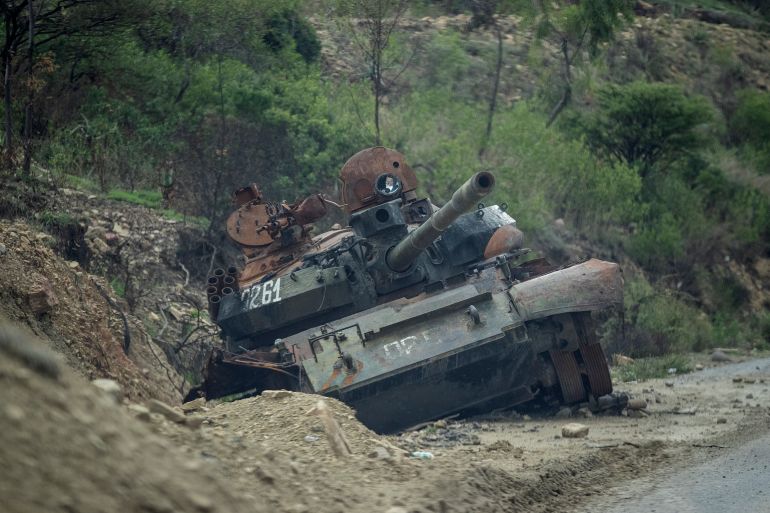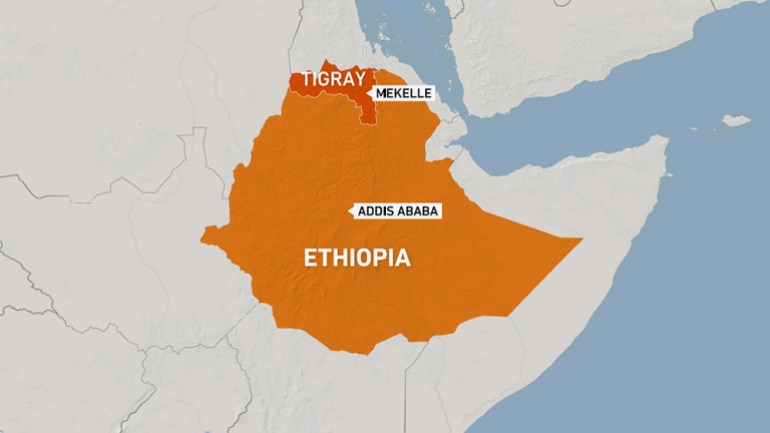Tigray rebels vow to drive out ‘enemies’ after retaking Mekelle
Despite unilateral ceasefire declaration by federal gov’t, Tigrayan leaders say they ‘will carry out all the tasks necessary to ensure the survival and security’ of their people.

Regional forces battling government troops in Ethiopia’s war-hit Tigray pledged to drive out “enemies” from the region, suggesting fighting will continue despite a unilateral ceasefire declaration by the federal administration in Addis Ababa.
The Tigrayan forces said on Tuesday the regional capital, Mekelle, was “100 percent” back under their control following the retreat of the Ethiopian government forces the day before, adding that they were conducting “mop-up” operations.
Keep reading
list of 4 itemsThree MSF workers ‘brutally murdered’ in Ethiopia’s Tigray
Ethiopia says it targeted rebels, not civilians in Tigray attack
Market air raid kills dozens in Ethiopia’s Tigray, say witnesses
“Our forces are still in hot pursuit to the south, east,” said Getachew Reda, spokesman for the Tigray People’s Liberation Front (TPLF).
“Our primary focus is to degrade enemy fighting capabilities … So if going to Amhara is what it takes, we will do it, if going to Eritrea is what it takes, we’ll do it,” Getachew told Reuters by satellite phone.
The retreat followed days of territorial gains by the Tigrayan forces battling Ethiopia’s government and its allies, including troops from neighbouring Eritrea and fighters from the Ethiopian region of Amhara, which borders Tigray to the south.
The swift turn in the nearly eight-month war has left people scrambling to understand what exactly is going on in the region of six million people as communications links are largely down.
Eritrean forces – accused of some of the war’s worst atrocities – are no longer visible in several Tigray areas, witnesses said. They had reportedly left the towns of Shire, Axum and Adwa but it was not immediately clear whether they had left other communities, where they were going, or whether the retreat was temporary.
Tigray fighters were reportedly moving into Shire on Tuesday, their latest gain after some of the most intense fighting of the war. They were now in control of much of the region after a major counteroffensive with mass popular support, International Crisis Group analyst William Davison said in a statement.

Ethiopian Prime Minister Abiy Ahmed ordered a ground and air military operation in Tigray in early November 2020, accusing the TPLF, the region’s ruling party, of orchestrating attacks on federal army camps.
The TPLF, which dominated national politics for decades until Abiy came to power in 2018, said federal forces and its longtime foe Eritrea launched a “coordinated attack” against it.
Abiy, the winner of the 2019 Nobel Peace Prize, declared victory in late November after the army entered Mekelle. Fighting, however, continued amid growing reports of massacres, rape and widespread hunger.
And on Monday, nearly eight months after the start of the conflict, the federal government’s military operation suffered a serious blow when rebel troops entered Mekelle, prompting celebrations in the streets as federal soldiers and members of an Abiy-appointed interim regional government fled.
Abiy’s government then announced on Monday night it was declaring a “unilateral ceasefire” – though there was no immediate response from the TPLF.
Instead, a TPLF statement said: “The government and army of Tigray will carry out all the tasks necessary to ensure the survival and security of our people.”
It added: “The government of Tigray calls upon our people and army of Tigray to intensify their struggle until our enemies completely leave Tigray.”
‘Big questions’
Al Jazeera’s Malcolm Webb, reporting from Nairobi, the capital of neighbouring Kenya, said there are “big questions about what’s going on now across the whole” of Tigray.
He noted that was not clear what the unilateral ceasefire announcement meant for actors in the conflict such as the Eritrean troops and Amhara militias, and noted that the TPLF has not yet acknowledged government’s declaration.
“It’s not clear at all if we’re actually any closer to having any peace and stability across the region at all,” Webb said.
Martin Plaut, a Horn of Africa researcher, told Al Jazeera that the federal government’s declaration “in some ways is laughable”.
“The Ethiopian government cannot have a unilateral ceasefire. What they need to do is open talks with the Tigrayans – they are the people they’re fighting – and those talks need to also involve the Eritreans,who have been directly involved in this war right from the beginning,” he said.
“You have to sit down and negotiate. When you negotiate, then the guns can fall silent and you can find the terms of an agreement.”
Though the Tigrayan forces did not hold any big cities and towns for months, its leaders have repeatedly boasted that they were regrouping in remote rural areas.
Last week, they launched a major offensive that coincided with Ethiopia’s highly anticipated national elections, which unfolded in much of the country though not in Tigray.
The results of the polls have yet to be announced, but they are widely expected to deliver Abiy a formal mandate.
‘Difficult’ road to peace
The brutal war in Tigray has been marked by killings, widespread sexual violence and other abuses, with the United Nations warning that the fighting has led to 350,000 people facing famine conditions – the United States says up to 900,000 people are facing famine.
The UN says government forces and their allies have repeatedly blocked aid convoys in Tigray.
“Aid must flood into Tigray,” Plaut pleaded. “They have to lug food into Tigray from everywhere it can come – through the ports of Eritrea or Djibouti, through Sudan, through Ethiopia.”
In announcing its ceasefire, the federal government said it would last until the end of the current “farming season” and was intended to facilitate agricultural production and aid distribution while allowing rebel fighters “to return to a peaceful road”.
UN Secretary-General Antonio Guterres said on Monday he had spoken with Abiy and was “hopeful that an effective cessation of hostilities will take place”.
He called recent events in Tigray “extremely worrisome” saying they “demonstrate, once again, that there is no military solution to the crisis”.
Britain, the US and Ireland have called for an emergency UN Security Council public meeting, which could happen on Friday, diplomatic sources said.
The Security Council has failed to hold a public session on Tigray since the war erupted, with many African countries, China, Russia and other nations deeming the crisis an internal Ethiopian affair.
Samuel Getachew, a freelance journalist based in Addis Ababa, said there is pressure for “some kind of ceasefire” because of the conflict’s regional implications.
“It is a regional conflict, the Eritreans are involved in the north, some Ethiopians are heading to Sudan so it’s no longer an Ethiopian issue,” Getachew told Al Jazeera.
“Ethiopia is a very powerful nation within the region, what happens in Ethiopia, especially on a large scale, will have an impact on other countries.”
Connor Vasey, an analyst with the risk consultancy Eurasia Group, said the involvement of Eritrean and Amhara forces “will complicate a blanket application of a temporary ceasefire, which so far appears to be a mostly unilateral move by the federal government”.
Should discussions on a possible political settlement actually go ahead, they “are likely to be difficult and protracted”, Vasey added.